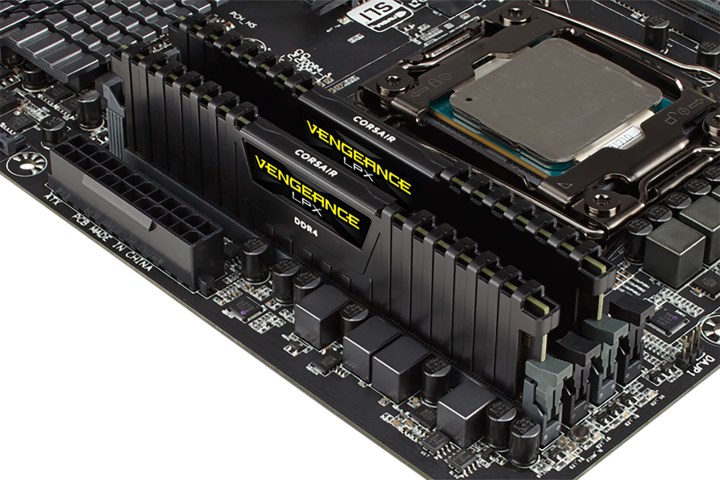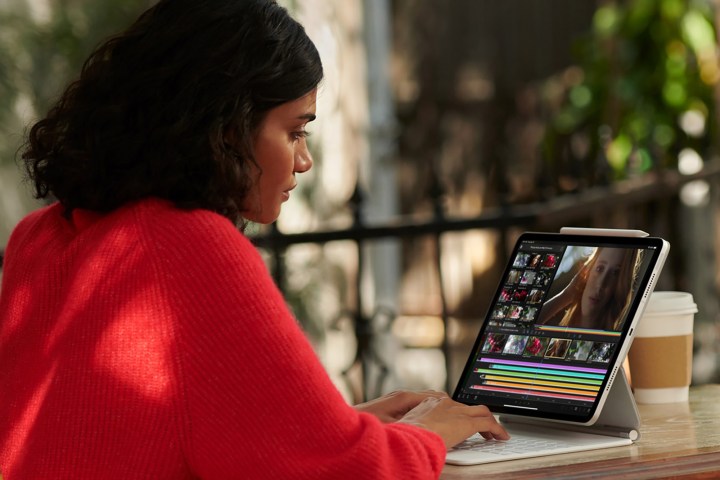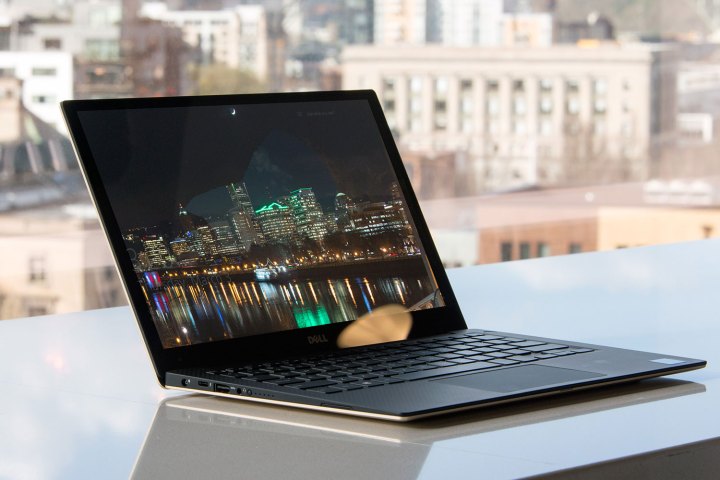
Random access memory, usually shortened to RAM or simply “memory,” is one of the most important parts of any computing device. Modern PCs, tablets, and phones typically have from 2GB up to 32GB, though some have even more. But how much RAM do you need, exactly?
Contents
- How much RAM do you need?
- RAM explained
- How much RAM for tablets?
- How much RAM for laptops?
- How much RAM do you need for gaming?
- RAM speed vs. capacity
- Upgrading your RAM can be easy and inexpensive
- Frequently asked questions
Adding more RAM to your computer won’t make it run faster if you already have enough, though, and wastes money you could spend elsewhere on upgrading your PC. Games that require 16GB of RAM won’t necessarily run faster if you have 32GB — although making sure background tasks have enough memory is a good way to improve performance in demanding applications.
Here, we’ll walk you through how much RAM you need for a tablet, laptop, desktop, and gaming machine. If you want to know how much RAM you need for a smartphone, we have a guide for that, too.
Related
- How to choose the best RAM for your PC in 2024
- DDR5 vs. DDR4 RAM: Is DDR5 worth it?
- The best laptops for programming, chosen by experts
How much RAM do you need?
For most PC and laptop owners, 16GB of RAM is a good figure to target. It gives you plenty of memory for most modern games, enough to run plenty of web browsing tabs at the same time, and you can even run demanding apps like video editing suites. You might want more, you might get away with less, but if you’re unsure how much RAM you need, 16GB is a good figure to target.
For a more nuanced look at how much RAM you need, here are some of the most common quantities of RAM, and who might be best suited to that quantity.
- 4GB: Low-end Chromebooks and some tablets come with 4GB of RAM, but it’s only worth considering if you’re on an extreme budget.
- 8GB: Typically installed in entry-level laptops. This is fine for basic Windows gaming at lower settings, but rapidly runs out of steam.
- 16GB: Excellent for Windows and MacOS systems and also good for gaming, especially if it is fast RAM, though some games still need more.
- 32GB: This is the sweet spot for professionals and high-end gamers. It’s enough to play any game, but pricing is still affordable.
- 48GB: Using non-binary memory kits can save you some money if 32GB of RAM just won’t do, and 64GB is unneeded.
- 64GB and more: For enthusiasts and purpose-built workstations only. Engineers, professional A/V editors, and similar types need to start here and go higher if needed.
Remember, buying more RAM than you need doesn’t net you any performance benefit — it’s effectively wasted money. Buy what you actually need, and spend the remaining budget on more important components like the CPU or graphics card.
RAM explained

RAM is a small amount of extremely fast storage and augments the cache on your CPU to make sure it has fast access to as much information as possible — much faster than if it had to grab that data from your SSD or hard drive. As you open programs, it stores data that they need access to quickly in system memory. When you boot a game, many of its elements are loaded into memory so they’re readily accessible.
Different programs require different amounts of RAM, but regardless of the application, it’s likely to use at least a little bit of RAM. That adds up over time, and if you don’t have enough RAM to go around, the applications you’re using will severely slow down. You can still launch them, but if you run out of RAM, the application won’t have access to the ultra-fast storage RAM provides to quickly access the data it needs.
You can also have too much RAM. If, for example, you’re only using 12GB of RAM under the most demanding circ*mstances and you have a 16GB kit, upgrading to a 32GB kit (assuming all other aspects are equal) won’t impact your performance whatsoever. It’s effectively wasted money.
Because of that, it’s important to choose a capacity that slightly exceeds your needs without going overboard. You can buy more RAM, and it won’t negatively impact performance. But that’s a bit like buying a house with four bedrooms and only using two of them.
System RAM shouldn’t be confused with the dedicated memory used by discrete graphic cards. High-end 3D games rely on video RAM, or VRAM, to temporarily store image data, like textures. Most current-generation graphics cards use either GDDR6 or GDDR6X. GDDR7 memory is coming down the pipe, though.
Meanwhile, system RAM is identified by its generation, with DDR4 and DDR5 being the most common in the latest generations of computers. DDR6 is in development but not readily available. RAM also has a speed rating, and a list of numbers known as its “timings,” which relate to its latency.
Although memory speed and timings are important if you want to speed up your computer, for most gamers and workers, simply making sure you have enough RAM is more important.
How much RAM for tablets?

Tablets are not designed to deal with heavy-duty software tasks, so their RAM needs tend to be pretty low — similar to a lot of smartphones.
However, as multitab browsers and more complex software continue to make the transition, the latest generations of tablets come with much more RAM than their predecessors. Current spec options typically range from 2GB to 16GB of RAM, with other considerations like battery life and processor speed often being of greater consideration.
Our favorite tablets have between 8GB and 16GB, though there are budget models which have less. There are some models with 4GB of RAM, but if you aim for more, you’ll have a much more responsive tablet.
How much RAM for laptops?

Most laptops come with 8GB of RAM, with top-tier machines packing 16GB — even up to 32GB for the most powerful gaming notebooks. As more games and applications demand more RAM, even mainstream laptops come with options for 16GB now, so configure your new laptop with more RAM if you think you’ll need it.
You’d only need to go past that if you perform certain tasks, like editing huge video or photo files or playing some of the most demanding games — though you should focus on CPU and GPU performance first if you need to maximize the return on your investment. Most people don’t use a laptop for such tasks, but if you do, buying enough RAM is crucial. It’s more difficult to upgrade RAM in a laptop (or, in some recent models, impossible) compared to a desktop, so buying what you need at the start is paramount.
For something like a Chromebook, which mostly relies on cloud-based apps and provides very little storage space, you won’t need much in the way of RAM and will be fine with 8GB of RAM when buying aChromebook, especially since some Chromebooks will let you use the Google Play Store to download Android apps directly on your machine.
How much RAM do you need for gaming?

For gaming PCs, 16GB of RAM is the best place to start, but it’s so cheap that anyone building a new gaming PC should consider 32GB instead. Although 8GB was enough for many years, new AAA PC games demand at least 16GB and some as much as 32GB — though those are very rare. Few games will actually take advantage of even close to 32GB of RAM, but many will saturate 16GB all by themselves, leaving little for background applications.
If you plan on streaming or running multiple applications while your games are running — OBS Studio, a web browser, etc. — 32GB will give you a little more room, and top-tier gamers might even want to go for 48GB with a non-binary memory kit.
RAM speed vs. capacity
While you won’t see any performance improvement by adding more RAM to your system if you already have what you need, the same cannot be said when it comes to RAM speed. Right now, DDR4 is standard across most desktops, laptops, and tablets, although many new AMD and Intel PCs come with DDR5 memory instead. Each DDR generation has a range of speeds, with DDR4 starting with DDR4-1600 and ending with DDR4-3200, while DDR5 starts at DDR5-4000 and ends at DDR5-8000. The number at the end notes the memory’s speed. The benefit of faster memory is simple: More cycles per second means the module can read and write data faster.
For DDR4 memory, kits that run at 3,600MHz are considered some of the best, as they work natively with Intel and AMD CPUs and offer excellent performance. Going higher than that can offer some benefit, but it means tweaking the settings to get the most out of it — especially on AMD PCs. For DDR5, the fastest the memory the better, but as you get into the extremes the cost rises much faster than the performance.
Different applications react differently to faster memory, and there are even differences between Intel and AMD. However, if you bought faster RAM sticks or plan to buy them, you’ll want to enable the XMP/EXPO profile in your BIOS to get the most out of your purchase.
Upgrading your RAM can be easy and inexpensive
RAM isn’t that expensive, and it’s the easiest component to upgrade in a desktop PC — laptops, too, in many cases. Buying a generous amount is wise, but don’t go crazy. There’s not much reason for a gamer to exceed 32GB for now, and no reason to exceed 16GB if all you want to do is watch Netflix.
If your system does eventually become restricted by RAM, you can just add more. This is a good idea even if you don’t feel comfortable upgrading it yourself, as the charge for installing RAM at your local PC store should hover around $40 to $60.
Frequently asked questions
Do I need 8 or 16GB of RAM?
Generally, we recommend 16GB as the right amount of RAM for most people. However, the specific amount of RAM you’ll need will depend on what your computing needs are and what your budget will allow. If you know you’ll just be a casual user and don’t plan on gaming or editing video much, 8GB of RAM should be enough. But if you know you’re going to be gaming or working on video projects, 16GB of RAM should at least be your starting point.
Can too much RAM be bad?
Having too much RAM won’t necessarily hurt your computer. But it is generally considered to be a bad purchasing decision, because having much more RAM than you actually use won’t speed up your computer. Having too much RAM is more of a waste of money, because the excess RAM isn’t being used.
Is 8GB of RAM enough for Windows 11?
According to Microsoft, you only need a minimum of 4GB of RAM for Windows 11. So 8GB of RAM should be more than enough to install Windows 11.
Editors' Recommendations
- Report: High RAM prices will continue to skyrocket
- Does RAM speed matter for PC performance?
- How to buy a gaming PC for the best performance and value
- How much GPU memory do I need?
- What is RAM? Here’s everything you need to know